


職稱:教授
聯繫電話:02-27321104 ext 53315
電子郵件:jwlin@mail.ntue.edu.tw
研究專長:概念改變與演化、模型與建模、科學素養評量
學歷:國立台灣師範大學科學教育博士
授課領域:生物、科學教育
研究室:科學館502室
B、不具匿名審查制度之期刊 (2019-2024)
Thagard, P. (2003)。概念和概念系統(林靜雯譯)。邱美虹等譯。概念革命(頁14-43)。洪葉文化。(原著出版於1993年)
| 今年月起 | 研究計劃名稱 | 主持人/共同主持人 | 補助單位 | |
| 2024.08-2025.07 | 整合學科觀點與跨語言設計雙語自然教材教法課程以提升師資生教學設計能力與信心 | 主持人 | 教育部 | |
| 2023.08-2026.07 | 以物質粒子模型類比建模為核心的自然與雙語自然教與學 | 主持人 | 國科會 | |
| 2023.08-2024.07 | 以學童語習慣及英語能力出發轉化科學專業術語以提升師資生雙語自然教學設計能力 | 共同主持人 | 教育部 | |
| 2022.08-2023.09 | 發展以類比為主題的建模能力評量與教學探索小學生所需物質類比建模能力 | 主持人 | 國科會 | |
| 2022.08-2023.07 | 以概念構圖提升師資生雙語自然教學設計能力 | 主持人 | 教育部 | |
| 2019.08-2022.07 | 發展教師專業成長及師培課程提升小學教師建模探究之內容知識與教學內容知識 | 主持人 | 科技部 | |
| 2019.08-2020.07 | 科普活動:第三屆南花蓮全民科學週─金針山與泥火山豆腐的科普教學宅急便 | 共同主持人 | 科技部 | |
| 2018.08-2019.07 | 科普活動:第二屆南花蓮全民科學週—金針山下科普教學宅急便 | 主持人 | 科技部 | |
| 2017.08-2018.07 | 科普活動:南花蓮2018全民科學週—金針山下科普教學宅急便 | 主持人 | 科技部 | |
| 2016.08-2019.07 | 建模仿真在科學教育上的應用——建立建模能力架構以促進概念改變與建模仿真的教學與學(優秀青年學者研究計劃) | 主持人 | 科技部 | |
| 2016.03-2016.07 | 普資源整合:科普列車---全民科學日科普活動數字化 | 共同主持人 | 科技部 | |
| 2015.08-2016.07 | 科普活動:全民科學週-科學FUN花蓮,花蓮縣「全民科學週」與偏鄉公民科普推廣 | 共同主持人 | 科技部 | |
| 2014.08- | 東台灣國小學兒童科學學習提升計劃:認知、動機與探究的重要性(科學教育培龍計劃) | 共同主持人 | 教育部與科技部合作計劃 | |
| 2014.08-2016.07 | 探討學生心智模式之概念設置順序及相關影響因素(優秀青年學者研究計劃) | 主持人 | 科技部 | |
| 2013.08-2016.07 | 以系統化方式建立模型與建模之線上教學與評價量系統——探討科學課程、概念發展路徑與建模能力之研究--以網路化模型與建模系統輔助教師科學建模教學與評價量 | 主持人 | 科技部 | |
| 2010.08-2013.07 | 以研究與教學為基礎之科學概念研究——以學生電學心智模式引入樹為基礎之交互式評量暨教學環境 | 主持人 | 國科會 | |
| 2008.08-2010.08 | 以研究與教學為基礎之跨國研究——以系統成長分類之概念為重點探討兒童電學心智模式之因果歷程與成因 | 主持人 | 國科會 |
教學與研究獎勵事蹟:
| 學年 | 項目 | |
| 112 | International Journal of Science and Mathematics Education, the Best Reviewer | |
| 111 | 國立台北教育大學理學院教學優良獎、國立台北教育大學優良導師獎 | |
| 111、112 | 國立台北教育大學國科會研究獎勵 | |
| 110 | 2022年東亞科學教育協會國際會議優秀論文獎「The influence of modeling-based socioscientific Issue on Preservice teachers' decision making - A case of highway route selection」 | |
| 109 | 2020年第35屆科教年會最佳論文獎「建模式探究教學法對國小高年級學生模型本質之演變」 | |
| 108 | 2019年第34屆科教年會最佳論文獎「以建模導向自發性類比探討學生電路心智模式的概念改變」一文寫作 | |
| 108-110 | 國立台北教育大學教育部補助大專院校實施特殊優秀人才薪酬方案(學術研究類) | |
| 107 | 2018東亞科學教育協會國際會議優秀論文獎「A particle sction research study of the impact of marker-centered STEM-PjBL on a rural middle school in Taiwan」 | |
| 105-107 | 科技部優秀年輕學者研究計劃 | |
| 103 | 學生推薦優良教師典範 | |
| 103-104 | 科技部優秀年輕學者研究計劃 | |
| 102 | 學生推薦優良導師典範 系優良導師典範 院優良導師典範 |
|
| 101 | 2013東亞科學教育協會國際會議優秀論文獎「A cross-grade study of re-validating the evolutionary precesses of students' cognitive characters in electric circuit」 | |
| 100 | 台北市立教育大學應用物理暨化學系及理學院100學年度優良教學教師 | |
| 100 | 台北市立教育大學100學年度國科會特殊優秀人才獎勵 | |
| 100 | 台北市立教育大學100學年度優質研究計畫獎勵 | |
| 100 | 台北市立教育大學100學年度學術研究獎勵 | |
| 100 | 台北市立教育大學重要社會研討會教材設計獎勵:以H1N1新型流感之社會研討會新聞提升學生通知識力、知識力、社會力 | |
| 99 | 第四屆亞洲化學教育者網絡研討會最佳海報獎 | |
| 99 | 台北市立教育大學99學年度學術研究獎勵 台北市立教育大學99學年度績優導師 |
|
| 98 | NARST(美國科學教學研究協會)國際委員會獎學金 | |
| 台北市立教育大學98學年度學術研究獎勵 | ||
| 97 | 國科會科教處97年度傑出學者養成計劃 |